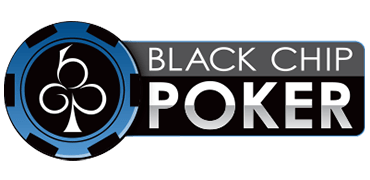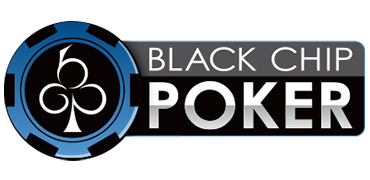In mid-December of last year, streamer and CoinPoker ambassador Facu “Fspadex” Galloand and Santi Garcia held a joint interview with renowned English player Patrick Leonard, known by his nickname “pads1611”.
Patrick has earned over $20M on the virtual stage, with 9 WCOOP titles and 8 SCOOP first-place finishes. He also has $3.4M in live earnings, with 7 final tables and a bracelet win at the World Series of Poker.
In the interview, Pads talked about different topics, such as his beginnings with poker, the Pocket Fives rankings , managing emotions, bad streaks, habits, studying, the three High Rollers in a row he won in Las Vegas, the football club he bought, his victory at the WSOP, some advice for online series, the December war and the future, and many other topics.
Interview with Patrick Leonard
Facu : Okay, so we start from the beginning. Patrick, first of all, we admire you, so we want to say welcome, and we want to know—how did you start playing poker?
Patrick : How did I start? Um, I started just for friends as most people probably do.
I was a soccer player, so on the weekend, we couldn't go drinking or like party Fiesta, so we used to play poker. I remember my friends like laughing; they weren't really my friends, they were people I was trying to impress, actually. It was like in school; you kind of have your friends, and it's like the cool groups, and I was invited with the cool group to play poker. They thought I was crazy; my nickname was like "crazy pads," so they would… I remember they were really rich, and I wasn't rich at all.
I used to work in a supermarket, so I would get paid like $4 an hour or something in England. That's not much, and I remember they would text me like, "Hey, like after work would you eat a spicy sauce for $50 or $20?" Like, they saw me as this guy who would do crazy stuff that they didn't want to do, but I could be the entertainment. They invited me one day to play poker, and they beat me. Straight away, I think I had something like King 10 or King Queen, and I just thought it was a good hand, and the board was maybe like 4, 5, 6 suited, but I just kept calling because I have a King and a 10, and then afterwards, they were all laughing.
Facu : Did you win?
Patrick : No, no, I didn't win. I had the idea that they were all laughing at me. I was like, "I don't like being this guy anymore," kind of thing, so I'm going to come back and win. I think I went back more and more often, and I would just start to win. Then, you know how it is when you play with your friends, and you take it seriously, they don't, it becomes a little bit easy. So we would go to the local casino and play here, and it was just, yeah, that's how it all kind of started. Those guys, teasing me or whatever, using me as their entertainment, I used that as motivation to beat them at something.
Santi : You started playing first live, and then, how did you manage to get online? Where you discover Two Plus Two, for example? I know you start reading in the forum there?
Patrick : No, I didn't realize.
Santi : How did you get into online poker and the 2+2 forum?
Patrick : I became interested in poker. I guess, I would try to consume poker, I would watch. I had one very good friend, Aaron, he's still a very good friend; he works in poker, actually. Our hobby became poker; we enjoyed it. We didn't have money to play high stakes or anything, we would just watch high-stakes poker, or we'd go on Full Tilt and watch.
Rail Heaven was this table on Full Tilt where people would go and watch and people would just wait to see who would turn up. We were very, like, poker fans first, rather than players. I would say we used to consume as much content as possible. From there, online was where people would post. We would watch Tom Dwan play high-stakes poker, then he would post on Two Plus Two. We heard this, and then we would go and read his posts.
On Two Plus Two, there's a search feature where you can read posts from years before. I wanted to see what these guys did when they were at my stage of my career, and I would read every post they ever made of people like Andrew Robl, Tom Dwan, people like this. I became interested in how they approached it, how they got good, what they had to do, how they went from basically playing with their friends to playing high-stakes poker. How can I get to Bobby's Room from playing with my friends for $1 kind of thing? I was interested in the people behind the posts.
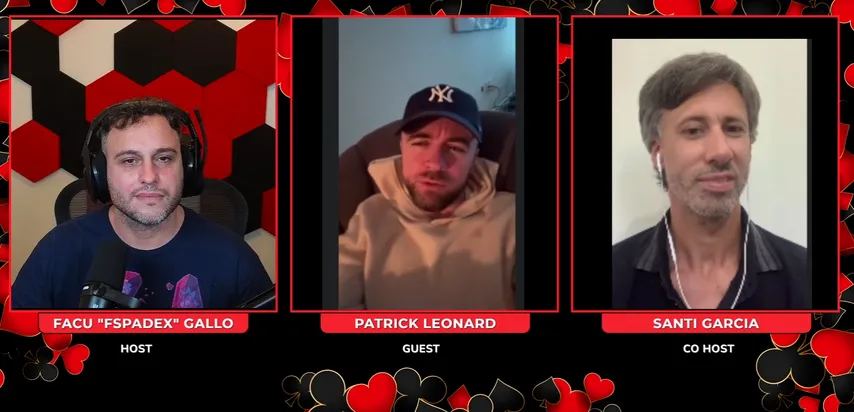
Facu : You started playing cash. Why did you move to tournaments?
Patrick : I was working, so cash games were easier to play, like, in the evening. Tournaments were difficult because they go so long, so cash games made more sense this way. I would play at work for an hour here, or 30 minutes here. With tournaments, you can't do this, but I would just have a table open in the bottom right, or something. Cash games were easier for me to sneakily play. I loved cash games always.
I never played tournaments. Cash game players looked down on tournament players, like, "Tournament players are terrible, we're really good." That was always how it was, so I never wanted to play tournaments. I didn't want to be seen as a tournament player.
I was going for Supernova Elite. This was maybe like 10 years ago, a little bit longer now. The year I went for Supernova Elite, Poker Stars canceled it, so it messed it up a little bit. I started playing tournaments that year.
I went to a live poker tournament; it was in Dusk til Dawn. Rob Young, maybe you guys know him, he plays. He has a casino in England, so he asked me to go. I went for a weekend, busted the tournament. I came like 20th. I cashed it on Saturday, woke up on Sunday, and played some tournaments just because that's what everyone was doing. I won three tournaments! I won the Sunday Warm-Up, which used to be really big back in the day. It used to be like $130,000 for first. Then I won the Sunday Six Max, which was every Sunday Six Max tournament, for like $60k. Then I won the Big 55, or the Bigger 55, for maybe $80k all in the same day.
I was like, "Wow, maybe it's okay," but I still thought it was stupid. I thought the people… I was like, "This is a stupid game," but whatever. I went back home, carried on Supernova Elite. If you lose your progress in Supernova Elite, you have to catch up a lot. You have to play six hours every day, but if you miss a week, you have to play eight hours to catch up.
Santi : Insane.
Patrick : Yeah. Supernova Elite and then the next Sunday came, one week later, and I said I'm not going to play tournaments, I'm just going to play cash games, but it's the anniversary Sunday Million. The anniversary gets like first prize, something like that, or maybe even more… maybe it's like 100 million. I can't remember; this was when PokerStars was at the top.
I said I'm going to play cash games, and then the anniversary Million just is one of my tables. I ended up final tabling it. Maybe I got like 9th, 150k or something like this, so now I'm like, "Okay, maybe I should play tournaments." I didn't think I was very good; I knew that other people were pretty bad. I didn't really know what I was doing, because I was playing with 10 big blinds; I'm used to playing with 200 or 100 or 300. I used to play Zoom for Supernova Elite. I would have like a thousand big blinds on every table.
It wouldn't mean I was up 10 buys; I was just very deep everywhere. I wasn't used to play and I was very loose, very splashy. I had a rule that I never folded pocket pairs.
Facu : Yeah, that's a good rule!
Patrick : It’s still kind of my rule, to be honest. If I have pocket fours and under gun raises, under gun plus one raises, and I'm on the button, I would just call. I was so deep it was kind of okay. Playing tournaments, you have to be more careful because people all-in and whatever. I wasn’t very good at tournaments at all, I was very aggressive and loose. The American players were still playing at this point.
So they were very tight. You could just run them over kind of thing. Pre-flop, they were very loose and aggressive, but if you went post-flop, they were very tight. My style just ran over them a lot, and they didn't know who I was. If you're someone like Michael Adamo, you can't bluff so much because people know you're going to bluff, and they'll call you. But because I was a new face or a new name, nobody knew me. For like six months, I could just play very aggressively, and people would fold because they were playing as if I was the population, not a high-stakes regular.
So for the first six months, my red line was super easy to win. It wasn’t because I was playing so well; it was just because they were folding all the time.
Santi : But tell me about the ranking of Pocket Fives. You reached number one quite fast. That must have been a good position to tell your parents, "Look, I’m doing something good in this game." Did it help you?
Patrick : Yeah, well this was the same year. After I had that first weekend, that first Sunday, then the second Sunday I played another month and then I got a notification saying something like I was #50 in the UK. I was like, "Oh, that’s quite cool!" I sent it to my parents, and they were like, "Oh wow, #50 is good." When I realized they liked that or saw it as recognition, I thought, "Oh, that’s interesting." Before, as a cash game player, I would never be in articles or magazines or websites, so they thought I was just some gambler or something.
Every Monday, Pocket Fives would update, so I would love to go on, and every Monday, I would see that I was now like #50 in the UK. Then I would send it to my parents. "Oh, now I’m #45!" Then it got to the point where my parents would message me, "Oh, what’s the update this week? Where are you?" They were wanting to follow it.
I finally got to number one in the UK, and then my uncle, who I never really even speak to, posted something like, "Today number one in England, one day number one in the world." I remember my mom liked the message on Facebook, and I was like, "Okay, I’m going to keep going." I knew that being number one would show my parents and friends from school that I was serious.
Even these people who thought I was a bit of a joke or crazy back at the start, it would show them that I’m making a lot more money than they are now. It was proof that I’m not crazy—I'm serious about this.
Santi : But then they suddenly removed all those rankings today. What do you think of that?
Patrick : Yeah, it’s crazy. I think poker in general needs those kinds of things—being recognized, whether it be in the Olympics or as a sport, and rankings are a good way to do it. The ranking system they had in the end wasn’t very good because if you played in GG Poker for 10K and did that 10 times, and you were in for $100,000, and you come 8th for, say, $65,000, you get so many points because the buy-in is big, and the PR points are so high.
But when we played, the biggest buy-in we would ever have was like $215 or $500. There were no big tournaments, maybe the Super Tuesday. So it meant if you were at the top, you were consistent. Now, you could be a losing player and be number one because you get so many points. The ranking system was quite bad. It was designed for 20 years ago, and it didn’t change the system for 20 years.
I didn’t even care about it at all anymore; it didn’t motivate me. Still, they shouldn’t delete it because there’s a lot of history in it. I would sometimes go back on a random night and look at who was number one 10 years ago today and see the legends and stuff like that. It was fun.
Patrick is one of the ambassadors of CoinPoker, which works (almost) exclusively with cryptocurrencies.
Facu : When you change game types, how do you shape your mentality to face negative streaks?
Patrick : I ran really good; I ran so good I didn’t lose for so long. I remember having a blog on a few different platforms, and if I had a losing session—let’s say at this point I’m up like $300,000 or $400,000—if I lost like $3K or $4K, I would post in the blog, “Oh my God, I ran so bad! This is unbelievable!” And people were like, “What the [ __ ] are you talking about?” I thought they were just laughing at me, like, “Oh, they don’t know,” but I had no idea about variance.
The variance I thought I was experiencing was not really variance; it was almost good variance to be losing so little. Now, if you have a bad session and lose a little bit, it’s good. If you can minimize the losses, that’s a win. Back then, if I had a small loss, I was like, “How can I lose against these guys?” But in tournaments, you just lose; it's just how it is. I didn’t have negative variance for a long time; I was running really, really good.
When it did start to happen, it never really impacted me negatively. I was very good at controlling variance, as well. Because the buy-ins were quite small too, it was hard to lose that much money. You couldn’t lose more than $10K on a Sunday, for sure. You could win big amounts because there were so many players, but you couldn't lose big amounts—there wasn't really negative variance.
Santi : But how do you balance your personal life with all the demands of playing poker and the volume with tournaments?
Patrick : I sacrifice a lot. I think I know where I’m going to be at different parts of my life—different parts of the year.
I know I'm going to be in Vancouver for SCOOP, which is a very important part of the year for me. I know I'm going to be in Vegas afterward, and then I know I’m going to be there for WCOOP after that. Those are the three most important parts of the year for me, and I think having that structure is nice because it means I can train toward each one of them. It means I can rest after each one of them, and then the rest of the year I can decide to do whatever I want in terms of being wherever I want—whether it be Dubai, Paris, London, or Vegas, where I am now.
It gives me a lot of flexibility to be wherever I want. I have strict parts of my life where I know I'm going to be in certain places, but the rest of the year, I actually have a lot of freedom. I can be where I want and do what I want. I definitely prioritize those big parts of the year.
If a friend has a wedding, I’m not going to go to it; if there’s a birthday, I’m not going to go to it. I’m always going to prioritize those parts of the year, and people know that. Maybe when I'm older, I’m going to regret it and wish I didn’t do that, but it gives me structure. It gives me something to work toward.
Facu : So, what do you do to prevent emotions from affecting your decision-making?
Patrick : I think I try to find where the emotion comes from. For example, if I'm feeling angry about something, I ask myself why I'm angry. Is it because I'm losing money and I can't afford to pay the bills? Is it because I want people to respect me more? Let’s say I lose a tournament—why does losing that tournament bother me? It’s just a tournament; you’re supposed to lose sometimes. Is it because I want people to see me as a good player? Is it because I need the money? Is it because I'm playing too high stakes and it’s affecting me?
I try to find out what’s making me angry so that I can understand it and remove it. For example, if someone starts getting a massage at my table, I’ll three-bet them straight away because they probably don’t want to bust after just getting a massage. If they fold a hand, which normally they wouldn’t, instead of thinking, "Why did I fold here?" they should probably try to work out why. “Oh, the masseuse is here; this is why.”
So yeah, I try to find the reason behind the emotion. I don’t just have emotion and think, “Oh my God, I’m so angry,” or, “I don’t want to do this.” I look for the reason behind it. Usually, the reason can be cured. You can work out why the reason doesn’t make sense and find a way to fix it.
Santi : If you could travel back in time, what would you say to the young Patrick who just started playing poker?
Patrick : I would say do everything for yourself. Don’t do it for other people. Don’t try to impress others. Don’t try to play a game just because you see other people doing it. When you’re in a community—whether it’s a coaching community or a Discord group—you’ll have really good players who post a lot, and then a lot of people try to emulate them.
If that player plays in a certain way, many will try to copy that style, but you're never going to be as good as that player. Instead, you end up being a bad version of that person rather than being the best version of yourself. Let’s say you have Michael Adamo in your community, and you want to play like him. But if you know you’re never going to play as well as him, you shouldn't try to play like him. It’s better to find your own style and make yourself the best version of yourself. Back when we had all the best players and coaches in the world—Michael Adamo, Fedor Holz, and all these guys—I found myself trying to play like them instead of my own style, which I was very good at.
When it came to in-game decisions, I would hear something they wrote or said, and I’d stop making decisions based on my understanding of the game. I’d start imitating their styles, which didn’t work for me. It’s crucial to stick to what makes you good, rather than blindly copying others.
Sure. I might understand how they want to bet the flop in a certain way, but I don’t know how to play the turn or the river. When I get raised on the flop, what do I do? I don’t know all of these things. I know that they want to bet the flop for a certain size, whereas, for me, when I bet my size, I know how I’m going to react. I know how I’m going to play turns; I know which hands I need to do it with. Being the best version of yourself is way better than trying to copy some player who’s better than you. You’re just going to make your game worse, not better.
Facu : What habit do you think changes your performance a lot?
Patrick : I think probably learning to play lots of tables. It helped me a lot. I realized that in poker, the goal is to make money. It comes from ROI times volume. If your ROI is 100% in a $100 tournament and you play one tournament, you make $100. If your ROI is 50% and you can play four tables, you make $200.
Even though you are twice as good a player as I am, I make twice as much money of you by playing more tables. I realized that playing more tables is a skill—it's something you need to train. It's half of the equation; you have ROI, then you have volume. Volume is as important as ROI, but most people just study how can I get better and make one big blind more of a win rate. They focus on how to improve my big blind defense and how to bet the flop better.
Facu : So, you play like... 25 tables?
Patrick : For me, the sweet spot is to play like 20. I'm okay if I play 12, but if I play less than 12, I’m getting a bit bored. I'm not feeling like I have as many decisions. I’m getting a little bit frustrated or antsy. If I have more than 25, I feel rushed. My time banks are disappearing. Twenty feels very, very nice.
The skill for me now is playing with concentration when I have fewer tables. That’s where the difficult part for me is now—it’s gone the other way around. When I get down to maybe six tables, I usually pull up tables of other people in the tournament and make notes. Playing live poker is very difficult because I have one table.
Santi : How do you study your game nowadays?
Patrick: It depends. I usually will have one topic that I'm really interested in for like two or three weeks, and I try to just think about this topic the whole time. I try to work on this topic, do a lot of stuff around it, and get very interested in a certain part of the game tree that is a little bit undiscovered and that people play badly. I find out ways where I can explore it a little bit, in ways that people aren’t prepared for, because a lot of people are prepared for most things. I like to bring weapons to the table that people don't have the armor to defend against.
So I do a lot of node locking. A lot of stuff where, okay, if this guy reacts in this way, what do I do? If he reacts in this way, what do I do?
I spent a lot of time—like the last five years—just studying the overall game, every node. In general, I don't really try to just study big blind against the button because I don't need to. I've studied it so much. I’d rather try to study stuff that people haven’t studied—different kinds of lines, maybe something like instead of betting the flop with a hand that always bets the flop, check, check, check, check, and then have some different river sizing. Where he needs to play his range in lots of different ways on the turn and the river. He needs to find check raises on the turn, check raises on the river. It's very tough for him to play against me if I start playing a more complex strategy—something like this.
I find these things more interesting than just studying blind versus blind or something like that.
Facu : What advice would you give to a person starting poker from zero?
Patrick : I would say don't start at too low of stakes. If you're going to spend say 10 hours and you have $20 to deposit on Poker Stars or Coin Poker or GG or whichever site you play on, instead of depositing the $20 and playing for 10 hours, I would recommend to get a job for $10 an hour or whatever. Work 10 hours, get the $100, and use that instead.
At the very low stakes, it's not really poker. You can't really learn; it's not going to help your game in the future. If you play NL2 for $2, you can win money because people are bad, but it’s not helping you improve as a poker player. If you want to be a poker player and learn and get better and better, it’s no point to play. It’s like if I want to be a FIFA player and I play FIFA against somebody who every time he got the ball he just turned around, ran to his goal, and kicked the ball in his own goal, sure, I would win the game, but I'm not going to improve as a player on FIFA.
When you play NL2, you're playing against people who are just kicking the ball in their own goal; you're not playing against people who are trying to score goals against you. I would try to get money somehow, work a little bit more and save up, and then play a little bit slightly higher where it's a little bit more serious.
Facu : Are you good playing FIFA?
Patrick : No, I kick the ball in my own.
Santi : What team do you choose on FIFA? Messi or Cristiano Ronaldo?
Patrick : I would choose Real Madrid because Mbappe is so fast.
Santi : Messi or Cristiano Ronaldo?
Patrick : Messi.
Santi : Seven years ago you managed to win three high rollers in Las Vegas. Tell us about that hot streak.
Patrick : It was a very tough summer. I don’t think I cashed a single tournament that summer until this time. There was one week before the main event, and I flew back to England to see my girlfriend for like a week before the main event. I flew back afterward. I arrived, and the next day I played the $25k, and I won. It was the main event the next day after that, and I bagged maybe the chip lead in the Main Event too, or like a very big stack.
I played on the day off of the Main Event. You play day 1A, then there’s day 1B with day 1C, day 1D, day 1E. I played this high roller again, and I won it, so now I'd won two of them. I came back for day two of the Main Event with a big stack, and at the end, there’s this thing called Bellagio Cup; it's finished now; it doesn't exist. It’s like WPT. It had a lot of runners – $10K, maybe 500 runners. I remember I went with my friend, who is a very funny guy, and we started, and I had 49,000, and he had 51,000.
I said to him, “Let’s swap 10%.” He's like, "How much do you have?" I said, "I have 49." He's like, “Oh, I have 51. If you catch up, then sure." I doubled up like 10 minutes later, I had 100K, and I text him, "How much do you have?" He's like, "Oh, 35k." I'm like, "Okay..."
Then we went for dinner after the tournament. He was happy for me, but he was sad for himself, I remember. That week was interesting; I was playing the same as I had all summer before. I didn’t change my strategy.
Earlier on in the month, people were saying things like, "Oh, you should stick to online poker," and, "You shouldn’t play live poker." Then the same people at the end of the month, when I won these tournaments, were like, "Oh my God, you’re so good!" It just showed me that I shouldn’t care about what people think.
These people don’t know anything. They told me to stick to online, and I was playing really well at poker. When they told me that, I thought, "Now I’m playing amazing in live poker." The truth is I was playing just the same as I was. I shouldn’t let these people change my mind or make me feel happy or sad. The people who matter to me are the ones closest to me—my friends and my family. For the next few years, I basically didn’t interact with many outside people.
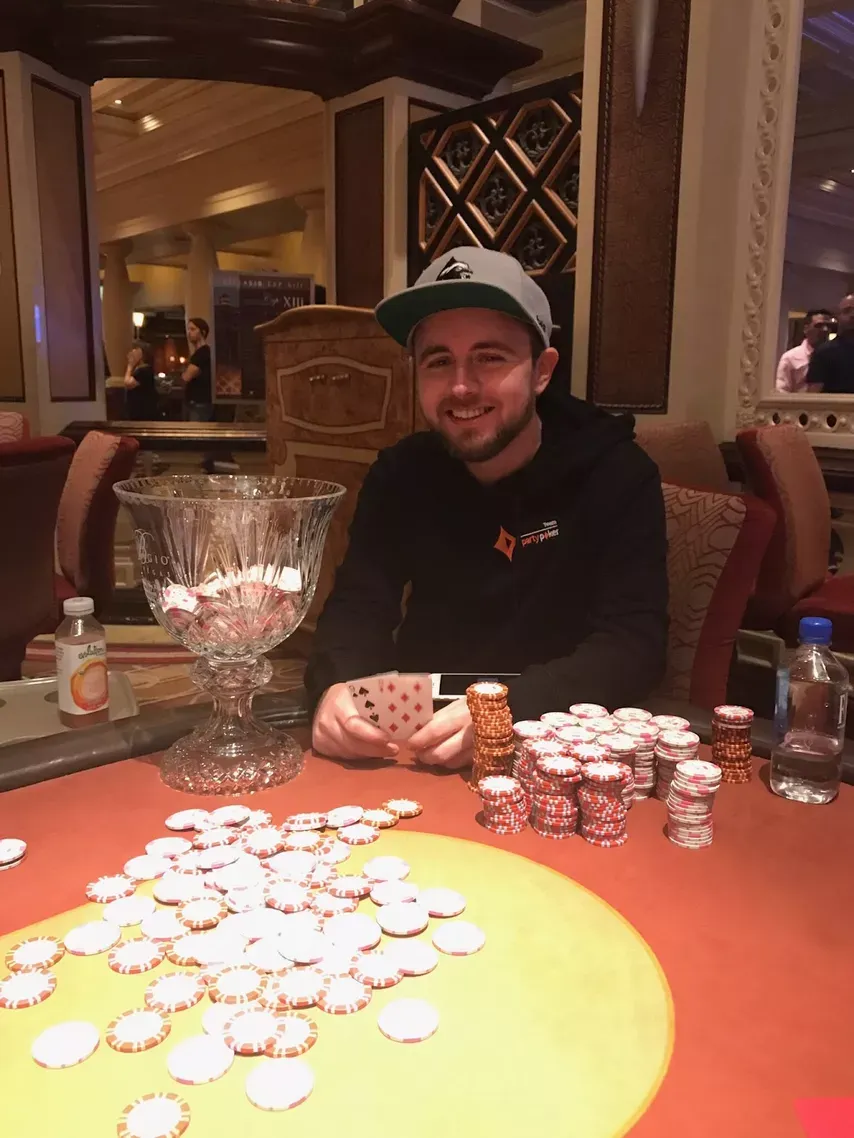
Facu : So we are going to switch a little. In 2020, you invested in Newcastle Independent FC. Can you tell us about that? How is it nowadays, and what division are they in?
Patrick : Yeah, I used to play for this team when I was 16, 17, 18. A few years ago, I started a data company—a football data company—where we looked into the best way to play certain strategies. The football industry wasn’t really looking into this as much. We called it "Don't Shoot," because we figured out that shooting was often a bad decision. You shouldn’t shoot your chances to score; you should try to do what Messi does and dribble the ball into the goal, basically.
So, we created this company, and it made sense to get involved with Newcastle Independent and try out some of our ideas. Some of my very close friends were there, so for a few years—I think about three years—we were there, and we won the league every year, which was really good. We were implementing different ideas compared to what other teams were doing, especially for set pieces and corners. We did things very differently, but it worked out well.
Then I had an opportunity to join a different team called Hashtag United. They’re a big team in England. They’re similar to Newcastle Independent, starting from the bottom, but they have a ladies' team and a large club. They have hundreds of thousands of viewers for each game; it’s very well-established.
I moved from Newcastle Independent and put my shares into Hashtag United, which is where I am now. The project is very promising. My team is Newcastle United; that's my father’s team. Last year, we had the FA Cup—our ladies' team played in the final against Newcastle, my home team. We beat them!
Santi : Okay, well going back to poker, tell us about your first bracelet in the tag team a couple of years ago. How did you choose to play with Espen?
Patrick : I had never met Espen before. I'm very shy and very, um... People probably don't realize it. Like, when I'm on social media and stuff, I'm very loud, right? I'm very like Instagram stories and stuff. It seems like I'm very outgoing, but I'm actually very shy. Like, I like to keep myself to myself.
I'm very quiet. I've never shouted in my life. I've never screamed, so I'm very calm. I'm very quiet. I'm very kind of just like I like to be by myself or with my close, close friends. But Espen reached out to me early on in the summer, and he was like, "Let's go for dinner or lunch."
Ninety-nine percent of the time, I always say no to this kind of thing because like I said, I'm shy, I'd rather just be by myself, kind of thing. Um, but I went, and we went for lunch, and we got on very well. We became friends, and over the, over the WSOP, we became like friends. We got on well, we didn't see each other so much or whatever, but we became friends.
Espen had had like a tough time before this summer, so he was asking for like some advice on some stuff, like with Luna, exactly. He was very, very rich, like with crypto, and then there was a huge crash with Luna. I had, I had a lot of Luna, too, and I think Nacho Barbero maybe lost millions.
So Nacho and Espen had like similar kind of thing, but Nacho maybe had some other stuff. Espen came into the series with not such a big bankroll, and, uh, also like for mine to have lost so much money, it's tough, but he handled it very well, and he was very mature about it. And, uh, there was a tournament, there was a 25k High Roller, I think, and at the same time there was a 1K WSOP event. The 25k High Roller was really good, but Espen said, "Look, like I'd lost this money, I'm thinking about playing 25k, but actually I'm just going to play the 1K. It's the responsible thing to do."
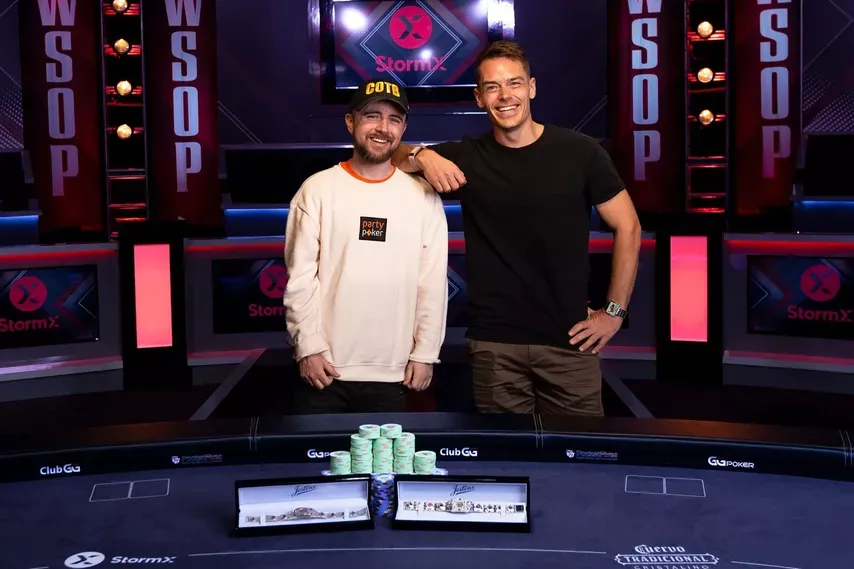
I kind of respected it because I thought it was like a sensible thing to do. Some people would maybe try to like chase back their money, you know, like try to get back the money they lost in this high roller tournament which was very good value, but he was very mature about it, so I respected that. And, uh, we kept on communicating because of that, I think.
And then tag team came up, and I think I posted somewhere on Instagram, like, "Hey, I'm going to play the tag team. Does anyone want to be my partner?" And I got a lot of messages obviously just from like different people, and, uh, Espen was one of the people, and obviously, I chose him because we were friends, and he's, he was the best player who replied, and the person I like the most, you know, like it just everything made sense.
Facu : What tips or routines could you offer for the SCOOP and WCOOP tournament season?
Patrick : think going for leaderboards is pretty good, and you can go for the low ones where the buy-ins are very low. If you play, you know, $5 tournaments, you can play these and still compete in the leaderboard. The leaderboards are cool because the WCOOP grind can become a little bit repetitive. If you lose a few days in a row, you're like, "Why am I doing this?" But when you're doing the leaderboard, you're still getting points even when it's not going well, so your session still means something.
I like the leaderboard stuff a lot. It also helps you learn the other games. I play all of the games now because of this. We don't know where poker's going to be in two years, five years, or 20 years. Hold 'em can be solved. They can be bots or whatever. With a lot of the other games, you can't use a bot or cheat because there's so many cards, it's too complex. So learning the other games I think can help you a lot in your career.
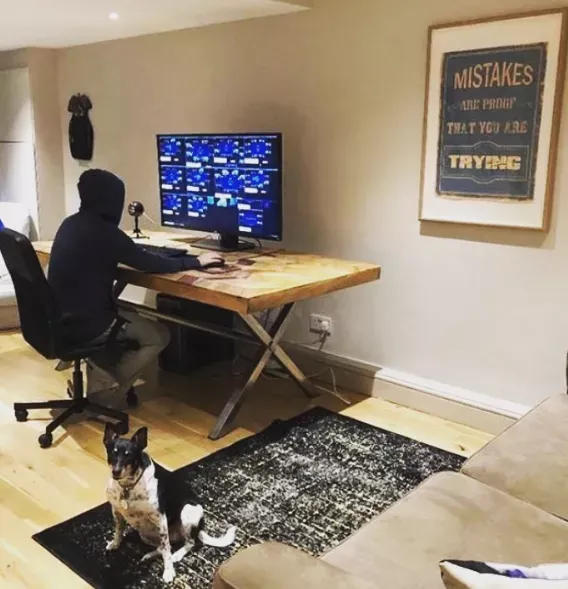
It can help you if you want to play the World Series, and playing these games is good because the field sizes are smaller, so you can have more chance to have success or win a bracelet. If you want to play cash games, like right now I just play mixed game cash games, and it gives me the opportunity to play them because I played them playing SCOOPs and WCOOPs. That's how I initially got into them.
Santi : Pat, we know we are in Las Vegas now. What reasons led you to choose Las Vegas instead of the Bahamas and Prague?
Patrick : There's a few reasons. The first reason being that I like to play the mixed game cash games here. I play every day in the Bellagio. If I went to Prague or WPT or the Bahamas, I couldn’t do that.
Two, I own a place here in Vegas, so I have my own place. I'm not in a hotel room. The people I want to spend time with are in Vegas. They're not in WPT or the Bahamas or Prague, so the people I want to be with, they're in Vegas as well. Everything just made sense to be here.
I haven't really played much of it, but I will play the main event. I'm not going to play much of WPT either. I'm just going to be playing the cash games instead.
Santi : Is it like a holiday for you with friends?
Patrick : I play all day every day, so I wouldn't say holidays. I just prefer cash games over tournaments.
Facu : You're the ambassador from CoinPoker. It means a lot to you, right? I see you talking really good things. What do you think about the site and crypto and everything?
Patrick : I think it's a very good philosophy. I think doing things in the right way, the right interests. Cash game challenges, the World Championship of Cash Games stuff like this is what poker kind of needs. We were saying it earlier, whether it be the Olympics or ranking systems or whatever, these cash game players... the top 30 players in the world, probably 25 of them, the industry doesn't know. They don't know who they are. They haven't seen the screen names. They just play on all these sites, they take the money quietly, and nobody knows them.
When I started playing poker, we spoke about watching high-stakes poker. I knew every single player who played high stakes. I used to read that Two Plus Two post. I used to watch them on Full Tilt. I was very interested. I started playing because I wanted to be like them. I was like, "Oh, if these guys can do it, why can't I do it too?"
We have so many players in the world right now who make so much money and play poker professionally that nobody knows about. The 20-year-old who lives in England now, he doesn't know about all these people who are so good and have made it up from playing for $2 all the way to playing for millions of dollars. CoinPoker is doing a good job making the games like relatable again, making them interesting again, and trying to make like heroes out of people again. I think that's an important thing.
Santi : Talking about the future, what goals do you have to achieve in poker before you retire and until what age do you imagine playing poker?
Patrick : I feel like I wouldn't play poker unless I felt like I could compete at the highest level. I don't want to drop down and just be like a mid-stakes player in a casino who takes money off like drunk people. I don't want it to get to that stage. I really like doing what I'm doing. I'd rather go into doing something else if I couldn't compete at the highest stakes.
For the next 10 years, I imagine I'm still going to play quite a lot, but maybe not as seriously, maybe just a bit more selective or something like this. Maybe in the next three years, I will try to... I always go back and forwards whether I want to play Tritons. I can never really make my mind up. I don't know if I want to do that or not.
If I did that, it would make me sacrifice some other parts, too. If I started to play Tritons all the time, I would have to then not play WCOOPs or SCOOPs as much, because they run at the same times. Right now, I'm happy doing what I'm doing.
Santi : How do you imagine your life when you stopped playing poker? How do you imagine it in 30 years?
Patrick : I think I will have a family and have a lot of animals, a lot of dogs.
I don't know how the world's going to be in 30 years. I'm not sure. I think I'd like to kind of maybe end up being a teacher or something like this. I feel like maybe end up just not working for money, just like maybe being a school teacher or university teacher or having some kind of program. I feel very fortunate, very lucky. I feel like maybe being able to pass things down to kids who've struggled in certain ways, or maybe in prisons. I find prisons really interesting. Hopefully I'm not in prison, but maybe in prison, working as like a psychologist or something like this. Maybe I find all these things rewarding or gratifying or things I would enjoy.
So yeah, I feel like that would maybe be good.
Santi : Maybe start the prison poker tour.
Patrick : Yeah, maybe, maybe. Maybe there's already one.
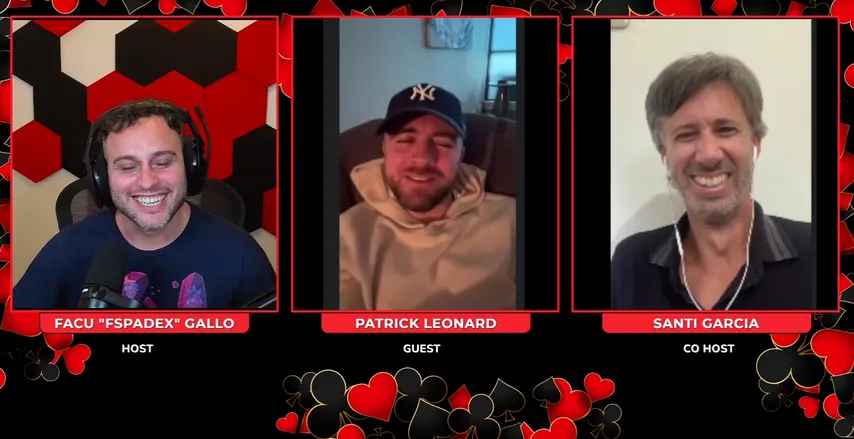
Facu : I want to thank you; it was an amazing time. We will prepare some next questions for a part two interview.
Patrick : Of course. Anytime. Thanks for having me. I'll see you guys on CoinPoker.














